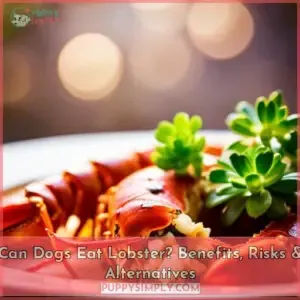This site is supported by our readers. We may earn a commission, at no cost to you, if you purchase through links.
 Are you ever tempted to share your delicious Hawaiian pizza with your pup? After all, who can resist those big puppy eyes and wet nose when you’re enjoying a tasty treat?
Are you ever tempted to share your delicious Hawaiian pizza with your pup? After all, who can resist those big puppy eyes and wet nose when you’re enjoying a tasty treat?
The truth is, some people may not be aware of the potential risks associated with pineapple pizza for dogs. While humans can safely digest this type of food, our canine friends have different dietary needs that should always be taken into consideration.
Before sharing any human foods like pineapple pizza with Fido, it’s important to know what ingredients are safe for him and which ones could potentially harm him.
In this article, we will explore whether or not dogs can eat pineapple on their pizzas as well as other key safety considerations concerning these treats so that you’re better equipped to make informed decisions about feeding them to your furry companion!
Table Of Contents
- Key Takeaways
- Are Dogs Omnivores or Carnivores?
- What Ingredients in Pineapple Pizza Are Safe for Dogs?
- What Ingredients in Pineapple Pizza Are Harmful to Dogs?
- Can Dogs Eat Pineapple on Pizza?
- Can Dogs Eat Pizza Crust?
- What Should I Do if My Dog Eats Pineapple Pizza?
- Frequently Asked Questions (FAQs)
- How much pineapple pizza is safe for my dog to eat?
- Are there any health benefits for dogs who eat pineapple pizza?
- Are there any health risks associated with feeding my dog pineapple pizza?
- Are there any alternative ingredients that can be used in place of pineapple on pizza for my dog?
- What precautions should I take when feeding my dog pineapple pizza?
- Conclusion
Key Takeaways
- Dogs can consume pineapple in moderation, but it can upset their stomach if given in large quantities.
- Pizza crust and dough should be avoided due to potential toxic ingredients and the risk of expansion in the stomach.
- Cheese should be given in moderation due to its high fat content and sodium levels, especially for lactose-intolerant dogs.
- Processed meats like salami, bacon, and sausage should not be fed to dogs, as they are high in fat.
Are Dogs Omnivores or Carnivores?
Considering their ancestors as well as their digestive system, you can see that dogs have elements of both omnivore and carnivore diets. They possess genes related to starch digestion and the ability to break down carbohydrates more efficiently than other predatory animals.
Dogs also have a longer intestinal length like an omnivore would, which is beneficial for fermentation processes.
Their feeding strategies tend to lie in between those of an omnivore and carnivores – they are able to consume plant-based foods but still retain some predatory qualities when it comes to consuming certain meats or proteins.
While olive oil or raw pineapple on pizza may not be toxic for your pup, there are many seasonings found in store-bought pizzas that could cause harm if ingested by dogs due to its high salt content or additives such as garlic and onions which can be poisonous for them in large amounts.
In general, pizza should only ever be given sparingly; overfeeding will lead your pet into obesity with all the associated health problems that come with it so it’s best avoided altogether!
What Ingredients in Pineapple Pizza Are Safe for Dogs?
Pizza is an indulgence that many of us enjoy, but did you know that it’s not necessarily safe for your canine friend? Although pineapple on pizza may not be toxic to dogs, the other ingredients such as cheese and crust can have adverse effects.
Furthermore, there are seasonings found in store-bought pizzas that contain high salt content or additives like garlic and onions, which can also pose a threat if ingested by dogs.
Pineapple
You should be aware that, while pineapples are not toxic to your pet, it’s important to take into account the potential adverse effects of other ingredients in pizza, such as salt and added seasonings, before offering any slices.
In moderation, pineapple is safe for dogs and can even provide beneficial minerals like manganese and essential fatty acids. Recent studies have also found that olive oil used on pizza dough is safe for dogs with no dairy allergies or sugar content issues related to pineapple toppings.
Raw dough must always be avoided due to its risk of expanding in their stomachs, causing breathing difficulties or tissue tearing. However, cooked pizza crust made with eggs may offer some nutritional benefits if done properly.
Finally, tomato sauce (without garlic) may give nutritional value, but store-bought options should always be carefully checked for harmful additives like onions prior to feeding them to your pup!
Cheese
Cheese is a common topping on pineapple pizza, but be sure to keep your pup’s intake in moderation as it can contain high fat content and calories. Saltier cheeses like feta or blue cheese should also be avoided due to their sodium levels.
Lactose-intolerant dogs should not consume any type of cheese, while those without such issues may benefit from low-fat cheeses like mozzarella, which are still packed with protein and calcium.
Too much cheese can lead to excess fat intake for your pet, so always monitor how much they’re eating if you do choose this topping! Pizza crusts with eggs added may offer some nutritional benefits as long as they are cooked properly.
However, raw dough is never recommended for our canine friends due to the risk of expansion in the stomach causing breathing difficulties or tissue tearing.
Crust & Dough
Avoid the temptation to feed your pup pizza crust and dough, as they contain potentially toxic ingredients such as yeasts, onions, garlic, and herbs. Pizza dough is not easily digested by dogs due to their low coefficient of fermentation and lack of starch-digesting genes.
Additionally, salt intake should be monitored closely when feeding a dog store-bought or uncooked homemade pizza with olive oil in it.
Raw bread dough can expand in a dog’s stomach, which causes difficulty breathing, while raw pizza dough is especially dangerous because it contains yeasts that are toxic until baked at high temperatures.
Points To Remember:
- Dough texture affects digestion in dogs
- Yeast toxicity can harm if consumed uncooked
- Salt intake must be moderated for safety
- Olive oil may provide beneficial effects
- Glucose digestion needs specific gene expression
What Ingredients in Pineapple Pizza Are Harmful to Dogs?
Pineapple pizza can be a tempting treat for your pup, but it’s important to understand that certain ingredients found in pineapple pizza can pose risks to their health. Onions and garlic are toxic when consumed by dogs, and seasonings and spices such as pepper or sugar should also be avoided due to the potential harm they may cause.
Additionally, processed meats like salami, bacon, or sausage should never be fed as these could disrupt your dog’s digestive system.
Onions and Garlic
It’s important to note that onions and garlic, though often found in pizza sauce, are highly toxic for your pup and should be avoided at all costs. To ensure the safety of your furry friend, you must monitor salt intake by avoiding processed meats like pepperoni or salami and moderating cheese consumption.
Furthermore, it’s best to bake the dough at a high temperature so yeasts don’t become toxic when consumed. When selecting store-bought pizza sauces, make sure they contain no onion or garlic as these can cause anemia if ingested in large amounts.
Be aware of symptoms such as pale mucous membranes with lethargy, which may indicate toxicity due to ingestion of ingredients intended only for humans.
Seasonings and Spices
You should be mindful of the seasonings and spices you use on your pizza, as certain ones may be hazardous to your pup’s health. Olive oil is a safe option for dogs in moderation, as it can help with their coat and skin health.
However, salt intake should always be monitored due to its potential negative effects on red blood cells in dogs.
Raw dough is also dangerous for them because of its yeasts that expand in their longer intestines than humans’.
Lastly, lactose intolerance needs consideration before feeding cheese-based pizzas so keep an eye out for any signs of digestive discomfort after consumption by monitoring the ability of your dog’s digestion when eating this type ingredients off a pizza base.
Processed Meats
Processed meats such as salami, pepperoni, and bacon are not recommended for your pet’s diet due to their high fat content. Fortunately, there are still plenty of pizza toppings that can make a tasty treat without compromising safety.
Eggs and olives provide vitamins and minerals without any added risk compared to traditional pizza toppers like these processed meats.
Lactose intolerance is also something you should take into account when choosing cheese-based pizzas.
Can Dogs Eat Pineapple on Pizza?
When it comes to feeding dogs pizza, the green parts of pineapple are generally considered safe. However, there is still much debate about whether or not pineapple on pizza is a bad idea for your pup.
There are some factors that need to be taken into account when determining if this topping is suitable for Fido’s diet. Firstly, while fresh pineapple contains many healthy vitamins and minerals beneficial for dogs in moderation, canned varieties tend to have added sugars which may cause weight gain or other health issues if fed in large amounts over time.
Secondly, as with all fruits and vegetables containing lactose – including pineapples – too much can give them an upset stomach due to their inability to digest the enzyme efficiently enough on its own without assistance from probiotics or digestive aids like yogurt-based products (especially those who lack an adequate amount of natural enzymes).
Lastly, because most store-bought pizzas contain high levels of salt which can lead to dehydration if consumed excessively by our canine friends; taking care when selecting toppings and ingredients should always remain top priority!
With these points in mind, let’s take a detailed look at why feeding our four-legged family members pizza – particularly one with pineapple – isn’t necessarily such a good idea after all!
Can Dogs Eat Pizza Crust?
Although it may be tempting, feeding your furry friend pizza crust is not recommended. Table salt and fats are often added to regular crusts, which can lead to health issues for dogs if consumed in large amounts over time.
Raw yeast dough may expand in their stomach, causing breathing difficulties or tissue tearing due to the toxicity of raw yeasts.
Cheese should also be given in moderation as high fat intake can cause digestive issues and weight gain when combined with a lack of exercise – especially for lactose-intolerant breeds!
Tomato sauce is generally safe, but homemade sauces tend to contain harmful herbs like onions or garlic, while store-bought versions usually have added sugar that’s unhealthy for pups too!
To keep your pup healthy, opt out from giving them raw yeast dough pizza crusts. Instead, give them cooked plain slices with no toppings as an occasional treat – just remember that cheese should still only be fed sparingly even then.
By providing healthy snacks such as fruits and vegetables alongside regular physical activity, you will ensure they maintain a good body weight without compromising on taste or nutrition!
What Should I Do if My Dog Eats Pineapple Pizza?
If your pup has consumed pineapple pizza, it’s important to monitor them for any signs of stomach upset or toxicity.
- Have regular checkups with the vet.
- Avoid giving your pet sugar-rich ingredients.
- Reduce fat intake by limiting portion size when feeding them human food.
- Offer only one small slice of plain pizza without different toppings as an occasional treat.
The good news is that most dogs can tolerate this type of snack in moderation, but be aware that too much cheese can cause digestive issues if they’re lactose intolerant.
Frequently Asked Questions (FAQs)
How much pineapple pizza is safe for my dog to eat?
It is not recommended to feed your dog pineapple pizza due to the potential for toxic ingredients and high-fat content. Consider limiting treats, such as small bits of cheese or tomato sauce, instead.
Are there any health benefits for dogs who eat pineapple pizza?
Eating pineapple pizza may not provide many health benefits for dogs, as the ingredients can be toxic or difficult to digest. Too much fat and sugar from the toppings could cause digestive upset, so it’s best to avoid feeding your pup this type of food altogether.
Are there any health risks associated with feeding my dog pineapple pizza?
Yes, there are risks associated with feeding your dog pineapple pizza. Eating too much of it can lead to stomach upset due to dairy or fat consumption. Additionally, the toppings on a typical pineapple pizza may contain harmful ingredients that could be toxic for dogs.
It is important to keep this type of food away from them and contact a vet if they’ve eaten too much.
Are there any alternative ingredients that can be used in place of pineapple on pizza for my dog?
It’s best to avoid feeding your dog pineapple pizza. Instead, use other ingredients like olives, cheese, tomato sauce, and egg that are safe for dogs. Avoid salty or processed meats, as well as seasonings and spices that can be toxic for them.
What precautions should I take when feeding my dog pineapple pizza?
Are you looking for a safe way to feed your pup pineapple pizza? Be sure to avoid store-bought pizza sauces as they may contain harmful ingredients. Use eggs and olive oil in the crust instead of yeast, and consider low-fat cheese or tomato sauce without onions or garlic.
Conclusion
In conclusion, it’s not recommended to feed your dog pineapple pizza, even in moderation. Pineapple may be safe for dogs to eat in small amounts, but the pizza crust and other toppings like onions, garlic, seasonings, spices, and processed meats can be harmful to them.
As a general rule, it’s best to avoid feeding pizza to your dog altogether. An interesting statistic to keep in mind is that one-third of all dog owners admit to feeding their dog human food, even though it can lead to digestive problems and weight issues.
Always make sure to keep pizza away from your dog, and if they do eat it, contact your veterinarian immediately.












